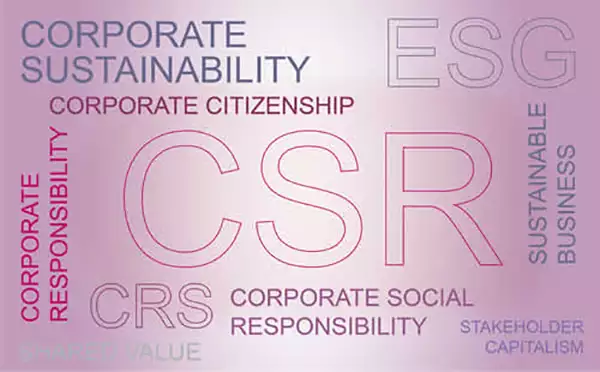What do you call sustainable business?
CSR (Corporate Social Responsibility) and sustainability are now common phrases, but organisations use many other terms to describe their approach to environmental and social issues.

What do they all mean?
Corporate Social Responsibility (CSR) and other phrases such as Corporate Sustainability, Sustainable Business, Corporate Responsibility (CR), Responsible Business, Corporate Responsibility & Sustainability (CRS) and Corporate Citizenship are commonly used, often assumed to have a variety of different meanings and emphases.
In the financial sector ESG (environmental, social, and governance) is used for the evaluation of non-financial performance indicators for corporate behaviour and the future financial performance of companies. Increasingly ‘ESG’ is also used by other companies with a strong investor focus.
Our opinion is that, at their heart, all of these terms refer to the management of environmental and social performance alongside economic performance.
Sustainability lite?
Corporate Social Responsibility is sometimes seen as a softer version of sustainability; perhaps focused more upon social rather than environmental performance or upon the PR and philanthropic elements of organisational behaviour. However, it can equally support a robust and ambitious set of activities and plans if it is understood as an organisation’s responsibility to perceive and respond to trends, demands, future challenges and opportunities.
Meaningful CSR (or sustainability/ESG/CR/any other related activity) should:
- Focus on core business activities
- Address the fundamental dependencies that an organisation relies upon in order to function (resources, energy, a capable workforce, customers able to make purchasing decisions)
- Demonstrate performance applicable to the company as a whole (not just anecdotes and stray examples), and be capable of verification by independent third parties
In essence, the words that an organisation uses to describe its approach are less important than the way it understands and interprets the implications of environmental and social issues for future activity. It must demonstrate engagement and interest in the views and desires of stakeholders, display ambition, understand the value of leadership through individual action and partnership and demonstrate progress over time.
It’s not what you call it but what you do that matters!

MORE ON SUSTAINABLE BUSINESS
Sustainable Business Strategy
Many businesses make claims about their sustainability, ESG or CSR. But without a realistic and effective sustainable business strategy, they are unlikely to deliver the gains that more sustainable performance can bring. Read more to discover how you can realise the benefits.

MORE ON SUSTAINABLE BUSINESS
Sustainable Transition
How is your business doing in sustainability / ESG compared to others?
Where do you want to get to?
What is your ambition?
Use this tool to navigate the sustainability landscape.
